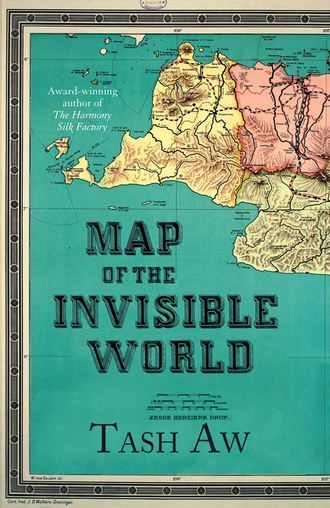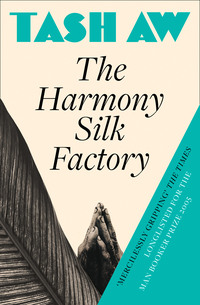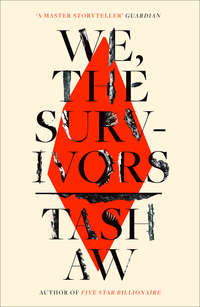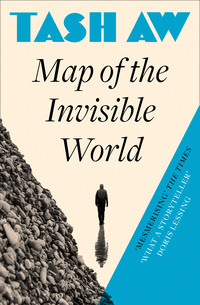
Полная версия
Map of the Invisible World
‘Good night, my son,’ Karl said, opening the door and breaking up the forest. ‘I know you’ve been having a difficult time, but just remember, we’re very lucky people. I hope you’ve had a nice birthday.’
Adam nodded as Karl turned the light out. ‘Wait,’ Adam said quietly in the darkness. ‘What day is it today? What’s my birthday?’
Karl paused at the door. ‘It’s August seventeenth.’
Later Adam would learn that August 17th was also Independence Day. On his birthday there would always be rousing songs on the radio as well as the President’s speech, the whole of which Karl would insist they listen to. There would be red-and-white flags hanging from the eaves of houses, and in the evening there would be festivities in the villages – food and dancing – that continued late into the night. Before he went to bed Adam would put on his magic lantern and stare at the swirling scenes that he knew so well, and he would listen to the far-off sounds of laughter and smell the faint sweetness of grilled meat and charcoal smoke that carried on the sea breeze.
No, Adam thought: he was not just like the other boys.
Slow down, Johan, slow down.
They drove through the silent city at speed, neon lights staining the night with electric temptations. PUSSY CAT $$$ SHANGHAI DREAM COPACABANA FANTASY GIRLS GIRLS GIRLS.
Please, Johan, slow down, Farah said. You’ll kill yourself one day if you keep driving like this.
At darkened intersections he ran the lights without even looking. He never looked out for other cars, he never looked out for anything. Don’t worry, he said, it’s OK it’s late, there are no cars. He drove with his head held back as if blown by the wind, but there was never any wind in this city.
Shit, Bob said in the back seat, this is great. He cowered as they careered round the roundabout, the new tyres of the Mercedes squeaking. Farah gripped the door tightly and said again, Please, Johan, for god’s sake, but she knew that there was no use talking to him when he was in one of these moods.
Hey, Johan, hey, guys, Bob said. Let’s go down to the river and see what’s happening with the girls. Friday night, all the Mak Nyahs will be out. Come on, let’s go.
No, Farah said. I don’t want to go. Johan, please.
Come on, Sis, be a sport. Let’s have some fun. What do you say, Johan? Everyone knows that those Pondans have the best tits in town. I want to see their little dresses with their asses sticking out oh, yes, sir.
Johan smiled and shrugged. OK, why not.
They slowed to a crawl as they left the lights of the broad tarred road and turned into a narrow lane, then into another alley, then a long thin road that ran along the shallow muddy river that hardly seemed a river at all, just a trail of sludge between two huge mudbanks.
Kill the lights, Johan, kill the lights quick.
The Merc crept along silently, hardly a rumble from its engine. Shadows stirred in the deep shadows under the old rain trees. There were a few cars parked along the road but it was difficult to tell if anyone was in them.
Get an eyeful of that baby, Bob said, sticking his head out of the window. The girls emerged from the darkness, singly or in pairs, linking their arms as they sashayed towards the car. There were all kinds of girls – Chinese girls, Malay girls, Indian girls and especially girls who were boys – but in the eternal nocturne of this street they were just girls.
Which ones are real, which are fake? Farah said. I can never tell.
Aduh, you’re really stupid, aren’t you? Bob giggled. What do you mean?
I mean, which ones are really girls? Don’t tell me you know which ones are, you know-
Transvestites? Johan said.
Yes, boys pretending to be girls.
Is it important? Johan laughed. He had a cold, hard laugh tonight. Farah did not like it when he got this way. Why do you need to know? Don’t tell me you want some action?
You’re disgusting.
Johan said, They aren’t boys pretending to be girls, they’re boys who are girls. Some of them aren’t even boys any more, they’re real girls…just like you.
Ceh. Farah shook her head. Don’t say that, they’re not like me.
Wow-ee, Bob cried. Hey girl, show us your tetek.
The prettiest ones are further up, Johan said, by that Austin under the big tree.
They stopped the car. There were about a dozen girls on the street. They felt safe now, they knew this car was not a police car. A couple of them walked in front of the Merc, swinging their hips and flicking their long glossy hair. Their calf muscles were taut and sinewy in their high heels and they swung small beaded handbags over their shoulders. Hey, boys, they cried, love your big car. Come here, boys, come and see what Mummy has for you.
Come on, Johan said and stepped out of the car.
Shit no way – Sis, stop him! That boy is crazy!
Johan come back, come back, Farah pleaded, it’s dangerous. But he was already some distance away, walking like he always did in his bright springy way with his hands in his pocket.
Johan, Farahs voice was an urgent whisper. Her footsteps in the dark: she was running. He did not look back. Ahead of him he knew there was a crumbling brick wall, just the right height to hide a couple crouching down behind it. And by this wall there would be a girl, always the same girl.
Hello, this girl said. Hello handsome. She was not tall and not short, the same height as Johan. She had slim shoulders and sturdy hips and she never concealed her face under a thick layer of powder, not like the other girls. I haven’t seen you in a while, she said, lighting a Winston. Where you been?
I’ve been around.
Is that your new girl?
No, that’s my sis.
Pretty.
Actually, she’s my adopted sister. Farah, Regina, Regina, Farah.
Hello.
Hello, princess. Regina took a long drag of her cigarette. It glowed like a jewel for a second or two before fading again. Listen, children, nice to see you, but I have stuff to do. You know. The cops have been down here already tonight touching the girls up and taking our money, so…
Yeah sure, see you around.
Who’s that? Farah whispered. Oh my god, Johan. Please don’t tell me you’ve been seeing prostitutes.
In the dark he made a slight movement with his shoulders, like a shrug but not quite. As they went past the Austin a girl got out of it, smoothing her hair away from her face. The bangles she wore on her wrist filled the air with a lovely metallic symphony, but the car suddenly started up and its lights filled the road with a sharp glare and suddenly there were people running for cover, dashing across the pool of light that swept along the lane before leaving it in darkness once more.
Shit, a baritone voice called out, I thought it was the cops again, now my hair’s all ruined.
Hair? Call that topi keledar hair? Darling, it’s a crash helmet, just take it off next time.
Where did you guys go? said Bob. Let’s get out of here. He was quieter now, sitting with his arms folded and his hands tucked tightly into his armpits as if it were cold. I want to go home. I’m tired.
No, Johan said. Not yet. The Merc emerged from the alley and burst into life once more.
Some time afterwards, when they were still driving, they reached that moment in the night when there were no more lights on the streets and the air that came in through the windows no longer felt hot and sticky, Johan said:
Do you ever get this feeling, Farah?
What feeling?
That your life is not your own. That you can’t control it.
No, what do you mean?
I mean, do you ever feel that your real life is somewhere else, that someone has stolen it and taken it to another place far away from here?
Farah looked at him and shook her head. No, Johan, Mummy says we’re not allowed to talk about that. Let’s go home.
No, said Johan. Anywhere but home.
In this fast young city he did not want to sleep, he did not want to stop. This was a place that had no past, only the present. What happened yesterday was just a dream; last week was forgotten, last month never existed at all. Every night was the same. Your life started afresh at six-thirty, repeating itself like a clock. There was no escape. It was always like that in this city.
5
The telephone stopped ringing just as Margaret opened her eyes. It had been ringing for a very long time. Her head hurt terribly. She squinted at the clock: nine-forty. She could not remember the last time she had woken up so late. She was turning into a grand old white housewife, she thought to herself as she padded her way slowly to the bathroom; she wished there was a bell she could ring so that some dusky, half-dressed youth would appear bearing two aspirins on a silver tray. She had fallen asleep in the rattan armchair in the sitting room and had remained there for some time before being woken by a stiff neck. She had summoned just enough energy to stumble into her bedroom and had fallen into bed without showering, and now she felt suffocated by her own cold sweat, as if someone had coated her skin with a thin layer of wet paint.
The phone rang again as she dressed. Now that she was awake and fully conscious, the phone seemed curiously dangerous. She picked it up slowly and put it to her ear but did not say anything; she barely even breathed. There was silence, as if the person on the other end was holding their breath too, and the air in her bedroom began to feel stifling. The line clicked and went dead. ‘Probably just the exchange playing up again,’ she said aloud. The sound of her own voice reassured her, and she began humming to herself, a vacuous tune that she soon realised was the song she’d heard at the Hotel Java the night before. Somehow, she knew the phone would ring again, and this time she would not be so cowardly. Dressed now, the pain in her head dull rather than stabbing, she reached for the phone as soon as its harsh drilling started up.
‘Hell-o,’ she said loudly, challenging the mystery caller.
There was a half-second’s pause. ‘Margaret?’ Din’s voice sounded timid, almost scared.
‘Yes, hi, Din, it’s Margaret here. Did you try calling me earlier? Just a second ago?’
‘Um, no,’ he said. ‘Are you OK?’
‘Sure,’ she said, sliding her feet into her shoes. She was sure it was he who had rung, it must have been. ‘You recovered from the horror of last night?’
‘It was interesting, actually, I was thinking about it on the way home. I’m glad you took me along. Maybe we’ll do it again some time.’
‘Sure. Maybe.’
‘Are you sure everything’s all right?’
‘Why shouldn’t it be all right?’
‘Well, it’s just, you’re always on time, that’s all. You’re usually here before me, so I thought I’d ring you to see if you were OK.’
‘What do you think might have happened? That I might have fallen prey to a wanton taxi driver? I just overslept, that’s all.’
Din did not answer for a while. Margaret imagined his inscrutable smile. ‘OK then,’ he said calmly, ‘maybe I’ll see you later.’
‘Yeah, maybe.’ She let the phone fall into its cradle with a crash and walked into the sitting room. The swirling green faux-marble Formica tabletop was half-covered in bits of paper and photographs. Margaret had not bothered to put them back into the box that lay at the foot of the low cane armchair. Last night, her head heavy with drink, she had wanted to look at all those dead images. She had not seen them for a very long time, and it had taken her a while even to remember where the box was. She had recovered it in the small storeroom into which she threw everything that she did not use on a daily basis, things that collected in layers as the years went by. And so, working her way through the archaeological dig of her life, she had found it preserved like a rare fossil in the pre-adult period, buried under old college textbooks but lying (more or less) on top of a box labelled Childhood in New Guinea. Once consigned to this storeroom, things rarely resurfaced; geckos laid their eggs on the spines of books and mice crawled into boxes to die. Margaret had no idea why she had spent a good hour and a half on her hands and knees, struggling with the flashlight wedged between her chin and shoulder, to free this box from its tomb of memories. She had looked at the pictures until it was very late, until she was alone in the night, when even the scooters and dogs and radios had fallen silent. She had been surprised to see how little she had changed, and had felt an unexpected surge of happiness when she recognised herself in the pictures. She had grown older, of course, but the similarities between the fifteen-year-old Margaret and the forty-something Margaret were obvious: the slight, adolescent build, the firm unfleshy arms, the hair pulled back neatly from the face, the chin raised in a perpetual challenge, the pouting smile. It was definitely Margaret.
She wondered if she would recognise the other people in the photos if she met them today. She certainly had not recognised her father when he lay on his deathbed. She had flown back to New York and driven upstate through an incipient snowstorm to be with him, kept warm only by the vestiges of the Jakarta heat. She had found him in a room that stank of disinfectant in a nursing home on the outskirts of Ithaca, his face pale and mottled, bleached of colour. The few wisps of hair on his head had grown too long and fell like threads of fine white silk across the scabs on his scalp. He looked like just another old man, like the ones playing cards in the hall. He was barely sixty but the cancer had taken hold.
When he smiled she felt a terrible pain in her chest; she had never believed that sadness could be a physical sensation. During that brief weak smile, she had recognised her father, the one whose image she had always kept in her mind’s eye. And she was glad when he closed his eyes again, for he became an old man once more, someone foreign whose pain, too, was foreign to her.
Here, in the photos, he was just as Margaret remembered him: lean and deeply tanned, barefoot and wearing a sarong, often staying in the background, ceding the spotlight to his wife. Margaret had not seen her mother for ten years and wondered if she would recognise her now.
Margaret put all the photos except one back in the box, and tidied the table. She picked up the newspaper article that Bill Schneider had given her, looking at it once more under the magnifying glass. It didn’t help. The picture only became fuzzier, its indistinct dots revealing no further clues. There was one white man in the crowd of twenty Indonesian ones, that was for sure. They were in a cell, or the back of a dark room. The flash of the camera had surprised a few of them; their faces were raised open-mouthed and dazed, looking straight at the viewer. The others just sat cross-legged, their heads bowed to their chests. Right at the back, the solitary white figure sat calmly with his back propped up against the wall, his head turned at an angle as if examining something on his leg. A small part of his neck was revealed, like a fragment of a precious mosaic, and Margaret studied it at length; the slight curve of it was unmistakeable – or was she just imagining the similarity? She had spent most of the night comparing the photo in the newspapers to her old photos but could not reach a conclusion.
The streets were already teeming by the time she stepped out into the dusty sunlight. Along the shady lanes near her house the drains were no longer overflowing but filled with shallow puddles of oily water, blocked by dams of rubbish rotting slowly in the heat. Two mangy dogs picked listlessly through the tangle of tin cans and empty sacks and vegetation as Margaret walked past a row of shop-houses, their bamboo blinds lowered against the sun. A hundred and fifty years ago, when Dutch Batavia was at its zenith, these shops contained sacks of spices and tea and fragrant wood bound for Europe where there was no limit to their prices; this was the port from which European fantasies were stoked to frenzied extremes, but you could sense none of the past glory in the streets of Old Jakarta. The voices of prosperous merchants did not echo in the narrow lanes, the clink of gold coins had disappeared a century ago. Even in the south of the city, in the place that some people called ‘New’ Jakarta, Margaret could see only decay. She had witnessed its growth, the simple, functional houses built seemingly overnight, stretching in rows like crops, punctuated by enclaves of big houses, where the roads suddenly widened and high cement walls hid immense Western-style mansions, the bright terracotta tiles on their faux-Tuscan roofs just visible above the walls. But everything aged so quickly here, Margaret thought; Jakarta had a way of dragging everything into its slimy mess, of making new things look old. Moss grew on surfaces of smooth cement; the sun and the rain wore down metal and stone and made them look dirty. In Jakarta she could never really escape the feeling of being in a slum.
She wandered into the square bounded by the last of the great buildings of Old Batavia, stumbling slightly on the remnants of the cobblestones. She flagged down a jeep-taxi in front of the porticoes of the once-handsome, almost-derelict old City Hall, watched by a group of soldiers who huddled in the shade of a wooden lean-to, sharing a kretek between them. ‘Hey, lady, got a cigarette?’ one of them shouted out without much enthusiasm, as if anticipating Margaret’s cursory shake of the head. She knew he wanted Marlboros or Camels, proper cigarettes, not the cheap kretek he and his friends were smoking. Not long ago she’d always carried a pack of Lucky Strikes with her. You could bribe anyone with American cigarettes. That was the curious thing about the human animal, she thought: even in times of famine they would sooner reach for luxuries than a sack of rice. A stick of tobacco laced with noxious chemicals was worth more than a meal for a child, that was why she’d always had cigarettes with her, but they had become so difficult to buy, so expensive, even for a foreigner.
The jeep jerked its way through the traffic, heading slowly south to the heart of modern Jakarta. The weather was on the turn now: the damp air of the monsoon season was beginning to blow into the city, the risk of heavy thunderstorms growing with each week. For the past few months the winds had been dry and dusty, the moisture bleached from the city, every object like tinder, ready to catch fire. Sometimes the air was so dry it was hard to believe that this city lay on the coast of a tropical island. The flimsy houses in the slums they now passed reminded Margaret of dead leaves on a bonfire, heaped up on top of one another, waiting for a single match or smouldering cigarette butt. There were always fires in the slums in the dry season, and every week for the last three months she had passed the blackened remains of houses, charred fragments of timber and corrugated iron, that just lay there, day after day, becoming part of the cityscape. And yet in a few weeks’ time they would be damp and slimy from the blocked-up drains and the pools of stagnant grey water that collected after the rains, and Margaret would forget the desiccating heat of August. How quickly we forget, she said to herself, how quickly we forget.
‘Stop here, please,’ she called out. The taxi shuddered to an abrupt halt outside one of the smart modern buildings on the fringes of the newly laid-out Merdeka Square. The giant rectangular box was made from smooth grey concrete; it had shiny glass in the windows and a façade of fashionable honeycomb shapes. Air conditioners hummed faintly behind closed doors as she crossed the immense foyer, her sneakers squeaking on the shiny terrazzo floor. Behind a semi-circular desk a security guard dozed in his chair, his head hanging limply to one side, his hands clutching a thin exercise book to his belly. There was no one else about; a solitary swallow fluttered aimlessly against the vaulted ceiling, desperately trying to find its way back out of the building. Margaret continued until she reached the back door, re-emerging into the heat. In the shadow of the big new building stood an older, smaller one, its timber upper floor giving it the air of a village house. There was hardly any space between the two structures – no lawn or yard, just a narrow drain. Typewriters clacked without enthusiasm in the stillness of the afternoon as Margaret went up the creaky wooden stairs. The radio was on, broadcasting one of the President’s speeches – a repeat, Margaret noticed – his voice urgent, persuasive, utterly convincing. There were a few men in the room at the top of the stairs, two of them hunched over typewriters, the others napping in flimsy reclining chairs or on canvas camp beds. The shutters were open but here in the shadow of their enormous neighbour there was never much light, just a perpetual gloom.
‘Hello, Sailor,’ she said.
‘My dear god,’ one of the men said, leaning back in his chair, ‘it’s Jakarta Jane, sweetheart of the forces. To what do we owe this most splendid honour?’
‘Nothing, just thought I’d pop by to say hello,’ Margaret said, easing herself into a chair.
‘I’ve never known Margaret Bates to “pop by” to say hello. What do you want?’ He had an open smile, his youthful face surprisingly creased with lines. He was a thick-set man with broad hairy forearms and thick agricultural fingers that looked thoroughly unsuited to writing or typing.
‘Do I detect a note of cynicism there, Mick?’
‘Not a note, a whole goddamn symphony. Rudy – get Margaret a beer, will you? And one for yourself too. In fact, one for everyone. We need no further excuse for a beer now that Margaret Bates is here.’
The other man, a stout young Indonesian, retrieved three bottles of Krusovice from a fridge that stood against a bare wall like a piece of modern art. He brought one over to Margaret, bowing slightly as he did so.
‘Hey, Rudy, did you know that Sukarno himself tried to get her to bed? He had such a hard-on for her.’
‘Do shut up, Mick.’ Margaret smiled and accepted the cold bottle of beer. Her headache had faded to a dull throb and she was feeling hot, dehydrated. ‘That was so long ago.’
‘Ah-ha! You admit it!’
She turned to Rudy. ‘Just ignore him. It’s all rumours. You know what you boys are like, forever looking for scandal. Journalists will be journalists – especially if they’re Australian.’
Rudy shrugged his shoulders indifferently, but continued looking at Margaret.
‘I had another job back then, it was different. I met the President a few times at official functions,’ Margaret began to explain, without knowing why she felt the need to. ‘He seemed to like me, and he remembered me. You know what powers of memory he has. I was friendly with his staff, so journalists used to ask me to arrange appointments at the Palace. All these dirty boys–’
Mick put the bottle to his lips with comic lasciviousness, his tongue curling outwards.
‘–started a rumour. You know the President’s reputation with women. Well, just for the record, he was always very correct with me.’
‘Um-hmm,’ grunted Mick as he drank his beer.
‘Very pleased to make your acquaintance anyway,’ Rudy said before returning to his typing.
‘So what do you need from me this time, darling?’ Mick asked.
Margaret picked up a slim, loosely bound book from Mick’s desk and began flicking through it – a collection of Chairil Anwar’s translations of Rilke. ‘Do you find him faithful to the original?’
‘He’s better with Gide. With Rilke it’s like he’s trying too hard, like he wants to be in tune with Rilke. There’s no such clunkiness with Gide, it’s like they know each other. Anwar would have been great with Rimbaud. They’ve so much in common – that unfettered lifestyle, don’t-give-a-damn hair…Shame he never discovered him. They’d have been the perfect couple.’
‘Bill Schneider accosted me at the Hotel Java last night.’








